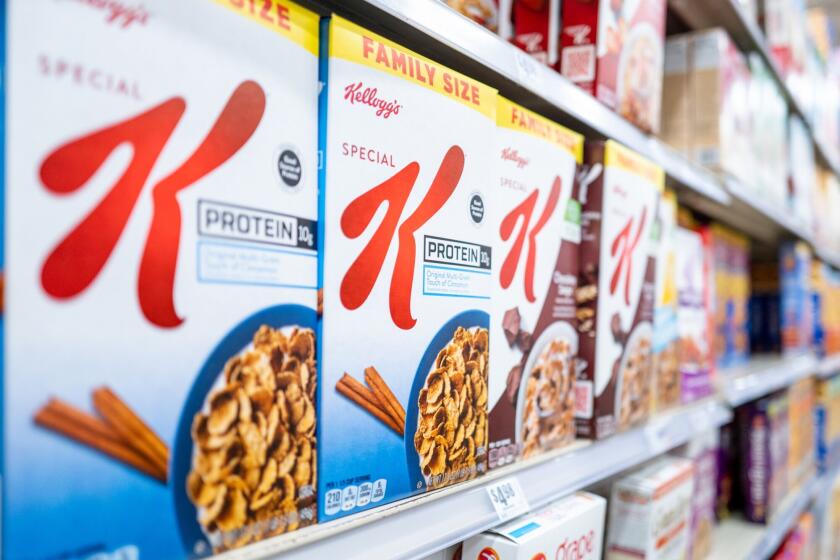Shoppers Expected to Spend More Freely This Holiday Season
- Share via
The approaching holiday shopping season looks promising, analysts said Wednesday, despite signs of a slowdown in consumer spending.
Though consumers pinched pennies in October, they plan to boost Christmas spending by 12% over 1995, according to survey results released Wednesday. Consumers will spend an average of $764 on holiday gifts, up from $695 in 1995, according to research from Deloitte & Touche and the National Retail Federation.
That note of optimism comes on the heels of news that personal spending increased by an anemic 0.4% between July and September, after expanding by 3.4% in the second quarter. But analysts don’t see the break in spending as a sign of a downturn. Consumer confidence remains high, they noted, and sales are strong at several of the nation’s largest department store chains.
“The holiday mood is positive,” said Irwin Cohen, a partner with Deloitte & Touche in New York.
The mood is upbeat in California as well. The Conference Board said its consumer confidence index for California, though it lags the nation, is 20 points ahead of its October 1995 level. Lynn Franco, associate director of the Conference Board’s consumer research center, said the numbers portend a strong shopping season in the state.
Also buoying the mood in California is continued job growth, said Bank of America senior economist Brian O’Connell. He said employment in California grew 2.7% through August, compared with 2.2% growth for the nation as a whole.
“I’m optimistic about seeing consumer spending rebound in the fourth quarter,” he said.
Analysts are predicting retail sales gains of 4% to 5% for the holiday season, with results in California in line with the rest of the nation.
The optimism comes as good news to retailers, who limped through the weak 1995 holiday season. Retail sales nationwide were up by a meager 3% as consumers headed for bargains and passed up clothing purchases--a critical factor in holiday buying.
This holiday season, analysts expect clothing purchases to be strong. They said the selection of apparel this season is stronger than it has been in recent years. Beyond that, it’s time for consumers who have avoided apparel purchases to freshen their wardrobes.
“It will be a strong fashion season,” said Walter Loeb, a retail industry analyst in New York.
The outlook for other gift categories is less clear. Analysts expect sales of electronic goods and toys to be flat compared with 1995. Though toys sell briskly during the holidays, there are no hot products to push purchases to new heights, analysts said. Electronics also suffers from a lack of new products.
Though electronics store chains and discounters face a fair holiday season, the outlook is better for department stores. Analysts said such stores have spiffed up their offerings, stocking up on clothing that’s attractive to shoppers in their 20s and 30s, while tightening their inventories to avoid getting stuck with unsold goods.
Those moves appear to be paying off for some chains. Bank of Tokyo/Schroder Wertheim has forecast strong sales gains in October for three department store companies. It predicts J.C. Penney will post a 9% gain; Sears, Roebuck & Co. will see a 6.5% increase; and May Department Stores will see a 6% jump.
Federated, the parent of Macy’s, is expected to post a 4% sales gain for October, whereas Dayton Hudson, owner of Mervyn’s and Target, should record a 3.5% increase.
The holiday season accounts for about 30% of retailers’ annual sales. This year, the season is shorter than usual, with five fewer days between Thanksgiving and Christmas than in 1995.
The loss of five shopping days means retailers will have to rely heavily on gimmicks to get consumers into stores early. Even so, analysts expect shoppers to wait until the last minute to buy. Loeb predicts retailers will see a 2% sales increase in the weeks before Thanksgiving and a 5% gain in the weeks leading up to Christmas.
“The urgency will be evident,” he said.
Few analysts expect already high amounts of consumer debt to dampen holiday spending. They said the growth in debt appears to have slowed and that some of the debt simply reflects the fact that consumers are more likely to use plastic than cash.
But they warned that their rosy forecasts could be derailed by unpredictable events. Bad weather that keeps last-minute shoppers from stores means lost sales.
“If we get two days of snow,” Loeb said, “all bets are off.”
More to Read
Inside the business of entertainment
The Wide Shot brings you news, analysis and insights on everything from streaming wars to production — and what it all means for the future.
You may occasionally receive promotional content from the Los Angeles Times.










